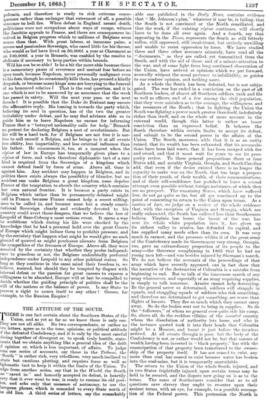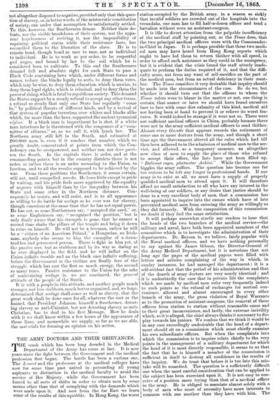THE ATTITUDE OF THE SOUTH.
11HERE is one fact certain about the Southern States of the I Union, and as yet as far as we know there is only one. They are not all alike. No two correspondents, or rather no Iwo letters, agree as to the tone, opinions, or political attitude >f the defeated Confederacy, and it is only by the most careful iiecing together of divergent or, to speak truly hostile, state- nents that we obtain anything like a general idea of the drift )f opinion or, which is less important, of affairs. To judge rom one series of accounts, say those in the Tribune, the ' South " is rather rich, very rebellious, very much inclined to etute but cautious plotting, and requires force as well as liplomatic tact to keep it within the limits of the Union. To udge from another series, say that in the World, the South as"caved in" and honestly accepted its defeat, is heartily orry that it ever went to war, is ready to resume its old posi- !on, and asks only that measure of autonomy, to use the ,uropean phrase, which is conceded to every State north of ire old line. A third series of letters, say the remarkably
able one published in the Daily News, contains evidence that "Mr. Johnson's plan," whatever it may be, is failing, that the South is not convinced or the North conciliated, and that the work, if the existing re'gime continues, will shortly have to be done all over again. And a fourth, say that appearing in the Times, represents the South as still bitterly sullen, still oppressed, still recalcitrant, but entirely unwilling and unable to resist oppression by force. We have studied these and three other accounts minutely, have read all the "documents," as they are called, yet transmitted from the South, and with the aid of these, and of a minute attention to the war, and of some light from long continued observation -of the Union, have arrived at opinions which we put forward, avowedly without the usual pretence to infallibility, as guides to our readers' opinion, and nothing more.
As a whole the South has been defeated, but is not subju- gated. The war has ended in a conviction on the part of all Southern leaders, of almost all Southern soldiers, rank and file as well as officers, and of a few among the civil population, that they were mistaken as to the courage, the willingness, and the resources of the North ; that in fighting the Union the South was fighting a power much greater than itself, indefinitely richer than itself, and on the whole of more account in the external world, though this latter is rather an inner conviction than an expressed belief. It behoves the South therefore within certain limits to accept its defeat, and submit to be the second power in the affairs of the Union. The South, moreover, adds that it is as an entity ruined, that its wealth has been exhausted, that its accumula- tions have been laid waste, that it has been ravaged with fire and sword, and that it must wait for years to see its pros- perity revive. To these general propositions three or four States add, and notably Virginia, Georgia, and South Carolina add, that even if the desire existed there is no longer the capacity to make war on the North, that too large a propor- tion of their youth, of their wealth, of their communications, and of their self-confidence has perished to leave a second attempt even possible without foreign assistance, of which they see no prospect. The remaining States, which have suffered less, do not go quite so far, but all are convinced up to the point of consenting to return to the Union upon terms. As a matter of fact, we judge on a review of the whole evidence that, with the exception of Virginia and Georgia, which are really exhausted, the South has suffered less than Southerners believe. Virginia has borne the brunt of the war, has sent its whole white population into it, has given up its richest valley to armies, has defended its capital, and has supplied many needs other than its own. It was very much in earnest, and the presence within it of the great army of the Confederacy made its Government very strong. Georgia, too, gave an extraordinary proportion of its people to the army—the Governor complaining in 1865 that he had no young men left—and was besides injured by Sherman's march. We do not believe the accounts of the proceedings of that army which have recently appeared, can in fact show that the narrative of the destruction of Columbia is a mistake from beginning to end. But to talk of the innocuous march of any
army whatsoever, and especially of an army requiring supplies, is simply to talk nonsense. Armies cannot help destroying.
Be the general never so determined, soldiers will straggle in squads, and straggling squads of soldiers who risk something, and therefore are determined to get something, are worse than flights of locusts. They fire so much which they cannot carry away. So do the bodies sent out to bring in supplies. So do the "followers," of whom no general ever quite rids his camp.
So, above all, do the reckless villains of the invaded country
whom the dissolution of authority lets loose, and who in the instance quoted took it into their heads that Columbia
might be a Moscow, and burnt it just before the invaders arrived. At all events Georgia is poor, but the body of the Confederacy is not, or rather would not be, but that masses of wealth having been invested in "black property," has with the emancipation of that property been transferred to the owner- ship of the property itself. It has not ceased to exist, any more than coal has ceased to exist because water has broken into the coal-mine, but it is temporarily unavailable.
The return to the Union of the whole South, injured, and in two States frightfully injured, upon certain terms may be held to be assured, and the dispute now going on is as to the terms. The mass of Southerners consider that as to all questions save slavery they ought to re-enter upon their
ancient terms, with an eye, for example, to a possible assump- tion of the Federal power. This pretension the North is not altogether disposed to negative, provided only that this ques- tion of slavery, or, inbetter words, of the aristocratic constitution of society, can under that assumption be satisfactorily settled. To this, however, the Southerners demur. Neither their de- feats, nor the visible breakdown of their system, nor the appa- rent hopelessness of reviving it, nor the impossibility of regaining political status while their resistance lasts, has reconciled them to the liberation of the slave. He is to remain bond, though bond as race to race, not as individual to individual. He is to work as per order, to be respectful quez negro, and bound by law to the soil which he is considered born to cultivate. To this end the Southerners demand full and absolute right for each State to pass a Black Code containing laws which, under different forms and names. reduce the blacks legally to serfs, to deny them votes, which may be wise, to deny them education, which is unwise, to deny them legal rights, which is criminal, and to deny them the powerof rising, which is fatal to republican society. This demand the States support by a steady refusal to accept any other terms, a refuge.' so steady that only one State has regularly come in," by political threats of different kinds, and by a revival of that system of popular terrorism over whites and blacks alike which, far more than the laws, supported the ancient tyrannical re'ginie. If a black man is impertinent he is shot, if a white man interferes he is threatened with the vengeance of a "com- mittee of citizens," or, as we call it, with lynch law. The Northern army still left in the South, and estimated at 200.000 men, is, even if it reaches that number, which we greatly doubt, concentrated at points from which the Con- federacy can be overpowered, and neither can nor does garri- son the South. In the capitals there is order, and at the commanding points, but in the country districts there is not order, or rather there is an order menacing to the Union, to freedom, and to all the results supposed to be achieved by the war. From these positions the Southerner, it seems certain, will not, until compelled. recede. He loses little except in pride by waiting, and his pride feels more aggrieved by the equality of negroes with himself than by the inequality between his State and some other in the Northern distance. Con- sequently he resists, and will resist, and is to all appearance as willing to do battle for serfage as he ever was for slavery, though conscious at the same time that he has not equal power. He has not. as some Northerners say, "accepted the card," or, as some Englishmen say, "recognized the position," but is only dimly aware that his strength is gone, that he cannot a second time shake the pillars of the temple and bring it down in ruins on himself. He will not be a freeman, rather he will be a "citizen of an American Poland." a Hungarian, an Irish- man, anybody who seems to him the exemplar of a down- trodden and persecuted person. There is fight in him yet, of the passive sort, but as stubborn and in its way as daring as he ever displayed in the field, and he will inflict on the Union infinite trouble and on the black race infinite suffering, before the Government or the victims are finally free of the struggle which has cost the first so much energy, the second so many tears. Passive resistance to the Union for the sake of maintaining serfage is, we are convinced, the general
attitude of the people of the South. v It is with a people in this attitude, and another people much stronger, not less stubborn, much better organized, and, we hope, determined that serfage shall cease as well as slavery, that the great work shall be done once for all, whatever the cost or the hazard, that President Johnson, himself a Southerner, detest- ing slavery as anti-Unionist, but not detesting slavery as anti- Christian. has to deal in his first Message. How he deals with it we shall know within a few hours of the appearance of these lines, and meanwhile we supply, so far as we are able, the materials for forming an opinion on his action.



































 Previous page
Previous page